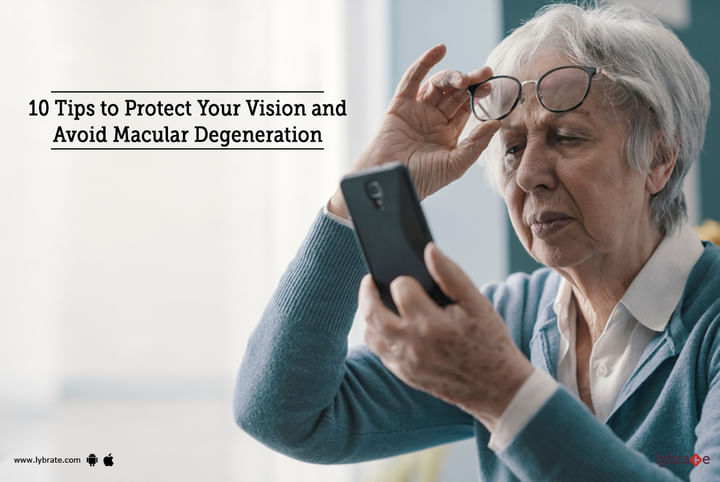10 Tips to Protect Your Vision and Avoid Macular Degeneration
What is Macular Degeneration?
Macular degeneration is an eye condition that causes damage to the macula, the part of the retina responsible for clear central vision. It occurs when the macula thins and deteriorates, making it difficult for individuals to read or see in detail. The most common form of macular degeneration is age-related macular degeneration (AMD).
While this disease may progress slowly for some individuals, others might experience more rapid onset and progression. People with AMD often find that their eyesight gradually gets worse over time.
Macular degeneration can lead to vision loss in some cases and is considered a leading cause of blindness in persons over 50 years old. It cannot be cured, but various treatments are available to help slow its progression and reduce associated vision loss.
What are the signs and symptoms of Macular Degeneration?
- Blurry or distorted central vision: This may make it hard for you to see details or words on package labels in stores, or affect your ability to recognize faces of people you know well.
- Difficulty adapting from bright environments into darker environments: This can make driving at night more difficult due to decreased visibility.
- Difficulty reading: A person with macular degeneration will often have difficulty reading fine print even if they use magnifying glasses.
- Distorted vision: Straight lines may appear bent or distorted at times, as if looking out a window with smudges on it.
- Loss of contrast sensitivity: Colors may appear washed out as if one were looking through sunglasses, making it harder to distinguish between similar shades.
- Needing brighter lights than usual when doing activities such as cooking or sewing: The person cannot take in enough visual information comfortably without extra light intensification.
What are possible complications of Macular Degeneration?
Complications associated with macular degeneration include:
- Loss of sharpness in vision, leading to difficulty with daily activities such as reading and writing.
- Trouble recognizing faces or identifying objects.
- Problems adapting to changes in light levels, such as entering a dark room after being outdoors in bright sunlight.
- Difficulty distinguishing colors or seeing fine details such as facial features or printed text.
- Problems perceiving depth even with glasses to correct any vision problem related to refractive errors like near-sightedness and far-sightedness.
- An increased risk of developing cataracts due to the damage caused by ultraviolet (UV) rays from the sun on an already weakened macula, leading to difficulty seeing long distances even after glasses are corrected for near-sightedness or other refractive errors.
10 Tips to Protect Your Vision and Avoid Macular Degeneration
- Wear sunglasses: UV rays can cause cellular damage in your eyes, and protective eyewear should always be worn when outdoors or driving your car.
- Eat foods high in antioxidants: Eat foods that are high in antioxidants such as leafy greens, carrots and squash. These foods help to protect the delicate cells on the macula from free radical damage.
- Exercise: Exercise regularly to improve circulation in the eye and body, it is important to boost circulation, which helps keep nutrients flowing to the cells of the macula more efficiently.
- Limit screen time: Limit screen time from computers, tablets and smartphones as too much screen time can lead to excessive strain on the eyes. Be sure not to spend more than two hours a day in front of a digital device if possible, this will limit fatigue and eyestrain caused by blue light exposure.
- Go to the doctor: Get regular check-ups with your optometrist or ophthalmologist who will check for any signs of early Macular Degeneration – an extremely important thing to do if you have a family history of this condition or think you may be at risk of developing it yourself!
- Eye exams: Have regular eye exams even if you think you have perfect vision – some early signs of Macular Degeneration may not be visible without professional equipment used by an optometrist or ophthalmologist during an eye exam.. Don’t let a small change go unnoticed!
- Quit smoking if you are currently smoking: Smoking increases one’s odds for developing Macular Degeneration by up to three times! Changes occur at a cellular level that could eventually lead to vision loss from Macular Degeneration so it’s best to stop now rather than later once symptoms already exist .
- Maintain normal blood pressure: Elevated blood pressure can cause structural changes in certain areas associated with vision health which include retinal vessels leading into the macula itself so try implementing lifestyle changes like dieting, exercising and eating healthy for better overall health as well as visual health too!
- Protect your eyes: Wear safety glasses when involved in hands-on activities such as gardens where debris may fly into your face unexpectedly – don’t put yourself at risk for injury including potential infection or other complications due to foreign matter entering into eye tissue.
- Get adequate sleep each night: Getting enough sleep each night is one of the most important things you can do to reduce the risk of macular degeneration. Sleep helps heal and repair the body, including parts of our eye like the retina and choroid which play an important role in vision. Studies have shown that getting below 7 hours of sleep each night may increase your risk for age-related eye diseases like macular degeneration. It is recommended to shoot for at least 8 hours or more each night to help prevent any vision-damaging conditions later on in life.
What are the surgical treatments for Macular Degeneration?
Surgical treatments for macular degeneration include:
- Photodynamic Therapy (PDT): A minimally invasive procedure used to rid the eye of abnormal blood vessels that can cause AMD. Extravascular Neovascularization, or the growth of abnormal new vessels on the retina, are targeted with a laser and destroyed using a photosensitive drug to stop any further vision damage.
- Subretinal Tissue Removal: This procedure involves removing damaged retinal tissues that are blocking light from reaching healthy photoreceptors in order to improve vision.
- Implantable Miniature Telescope (IMT): This is a small device that is surgically implanted in the eye. It works by magnifying images, allowing people with severe vision loss to have improved sight and even be able to read. After implantation, the IMT can't be removed and it allows individuals to see through their paralyzed eye as if they had normal sight.
Best doctors to consult for Macular Degeneration
- Macular Degeneration is a serious disease that requires professional medical attention but with early diagnosis and proper medical care, individuals can find ways to manage their condition and improve their quality of life.
- The best doctors to consult are ophthalmologists and retina specialists, who specialize in retinal diseases like Macular Degeneration.
- Ophthalmologists: They provide comprehensive care, including evaluation, diagnosis, and treatment of eye conditions.
- Retina specialists: They are equipped with advanced knowledge on the retinal diseases like Macular Degeneration and can provide specialized care.



+1.svg)
